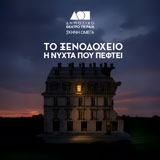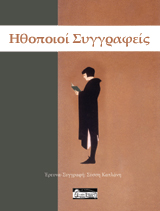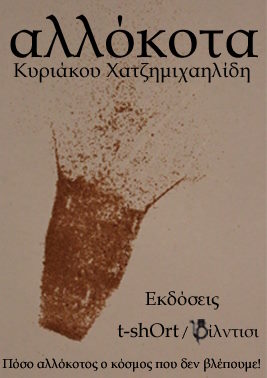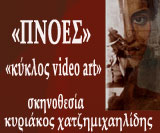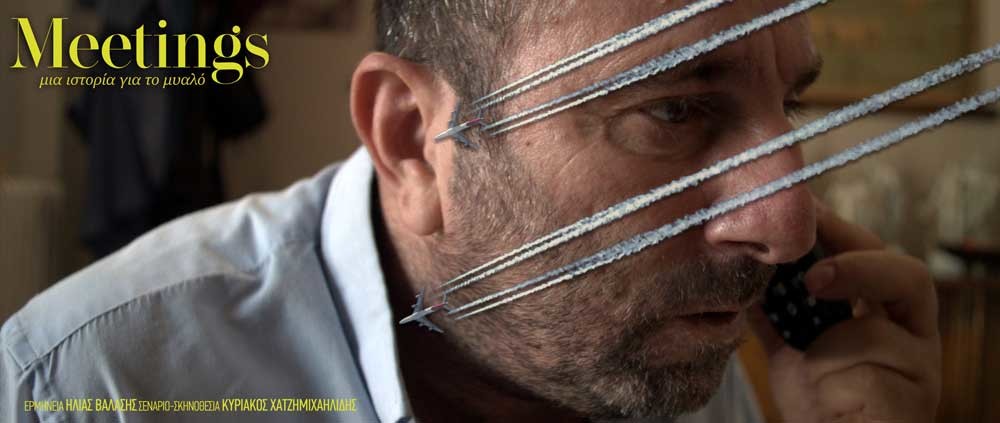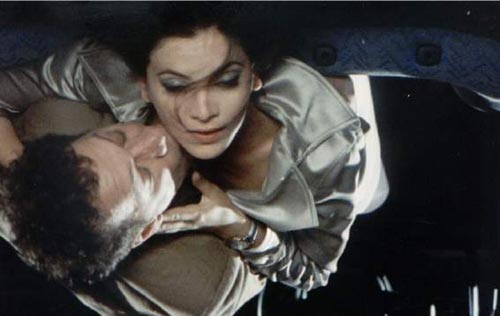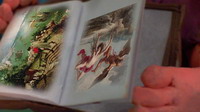

Icarus-Jump into the future
Script
ICARUS
Jump into the future
by Stavros Koutrakis
ENTRY
NARRATOR –
Clotho turns the spindle
and Lachesis weaves with care traditional motifs, well-tried through the long centuries.
Old time is the warp,
Need the shuttle,
gods and men the weft.
Harmony is a wise guide,
Good measure is the stop!
Transparent peace then rules earth and sky.
People are respectful, self-sufficient, grateful for their good fortune,
while the gods spend their boundless time in feasts and petty squabbles, demanding from mortals the smoke of sacrificial meat.
Repetition makes smooth the stream and life reaches a stalemate until…
A wrong move of the shuttle brings something new.
NARRATOR –
Infinite blue!
The sea is angry at the Aegean’s eastern limit.
Samos with her high peaks and to her west the long island (Doliche).
Above it, not too high, not too low, Daedalus seeks his son Icarus.
But he, foolish, flying much higher, pays the price for his recklessness.
ICARUS –
Father! Gods! I’m losing my wings! Titan Prometheus, friend to mankind, come to my aid!
However much too far I went, I do not deserve such an end.
And yet we did well to fly, father. We saw so much and learnt even more. If we had not dared…
Remember our impasse in the Labyrinth…
NARRATOR –
Everything converges in this moment which symbolizes the first time, every first time that man ignores the laws and limits to confront the impossible! Icarus rises first.
Below him the dreadful Labyrinth diminishes. It loses its force. It threatens no longer.
Daedalus still hesitates, but the guards of king Minos, in alarm, come running from all directions.
They approach menacing. Necessity! Daedalus dares! He too rises in the air!
NARRATOR – Daedalus, the first architect, the ingenious Athenian, son of the skillful Eupálamos and Alkippe, descendant of Erechtheus.
By tradition the inventor of numerous tools:
the saw and the axe, the plumb-line, the drill, also ships’ sails and masts, he personifies craft and invention in antiquity.
His great reputation as an architect, eminent sculptor, distinguished craftsman and inventor, followed him as far as the Crete of king Minos, son of Zeus and Europe, where he arrived as a fugitive or exile.
According to rumours he hurled down from the Acropolis his talented student and nephew, Tálos, as a dangerous adversary in his struggle for knowledge. This clearly symbolizes the fatal rivalry of men in the acquisition and use of every new technology.
Anyway, Minos welcomed him with great honours and entrusted him with the construction of the palace in Knossos.
The result of Daedalus’ plans was the legendary Labyrinth, a work of monumental architectural worth. An enormous building complex with 1300 (!) rooms, courtyards and storerooms, decorated with wonderful wall-paintings, some of which survive to the present day.
Many other works in Crete and elsewhere are attributed to Daedalus.
Unlimited glory, however, brings rivalry and enmity in the end.
Thus Daedalus soon fell into the disfavour of the king of Crete.
Mythology offers two explanations for this change.
According to the first, disfavour was caused by the preposterous and passionate love of Pasiphae, wife of Minos, for the holy bull of Poseidon and her union with him with the help of Daedalus, from which resulted the birth of the Minotaur, the horrible monster with human body and head of a bull, who lived in the depths of the Labyrinth and fed on human flesh.
According to the other explanation it was Daedalus who gave the thread to Ariadne thus enabling the hero Theseus to emerge alive from the Labyrinth, having slain the Minotaur.
Be that as it may, these symbolic narrations tell us more about how well new knowledge and achievements were guarded by their owners to keep the advantage for themselves.
Thus, Minos shut Daedalus in the Labyrinth, together with his young son, Icarus.
NARRATOR –
That morning, before dawn, everything was almost ready. They had to start on their venture while it was still dark.
In the most secure corner of the courtyard Daedalus fixes something with care and speed and gives his son Icarus final instructions.
DAEDALUS –
Our only way of escape is the sky. I think we are ready, but perhaps we should think again…
ICARUS –
Let us dare, father. The closed walls of prison are not for us. Something new awaits us! Let us dare. I have faith in your wisdom. Let me go first!
NARRATOR –
Icarus! Son of the high born architect Daedalus and Nausicrate, a slave of Minos.
Once more, wisdom and nobility must be assisted by the vigour furnished by intercourse with youth! Daedalus knows this well.
DAEDALUS –
And remember well what I told you. Fly at the correct height.
If you find yourself too low down, the sea breeze and salt spray will weigh down your wings.
Cloth and wicker we have joined. Not too high either, do not approach the burning disc of Phaethon.
There is wax in the joins and if it is heated it will melt.
Then your wings will disperse and you will be a vain suppliant in the hands of the wind.
Remember these words Icarus, because youth is rash and human nature curious, and they will push you to the edge.
Keep the heavenly mean and the sun to your right until noon.
ICARUS –
I will not fail, but we delay! Day has begun to dawn
NARRATOR –
Thus he spoke and Icarus heard but could not contain himself.
He flaps his wings to and fro in the courtyard, trying out his new-found strength. Two short leaps at first and then – lo and behold! – he rises from the earth. He flies! In awkward circles, like an eaglet’s first flight, he rises continually. Daedalus notices how the wings work and is proud. But he hesitates. Icarus rises higher. Uproar is heard. The guards of Minos see him. First fear but soon responsibility to the king agitates them.
They shout and fire arrows to the sky, but to no avail.
Daedalus hesitates no longer. Necessity!
He skillfully spreads his wings and …there he is! He follows his son.
Mad with anger and helpless the guards watch the miracle!
NARRATOR –
The Aegean disperses the morning light in colours and the sky is blood red low in the east. Guardian Crete dwindles and disappears behind them, tiny and insignificant.
Daedalus worries. His son, much farther and upwards, a dot towards the north, proceeds with reckless youthful enthusiasm.
He goes up and down in dangerous manoeuvres, wasting his strength aimlessly.
He seems to have overcome his initial fears and tests his strength to the limits without further anxiety.
The distance between them grows by the hour.
DAEDALUS –
Icarus, my son, do not hurry! Remember my advice. Do not fight against the wind. Respect him and measure his strength. Embrace him and accept his help.
NARRATOR –
Distant and frenetic the voice of Icarus was heard:
ICARUS –
But it is so beautiful, father! See how everything has diminished! How the high mountains are humbled before my flight! Let me taste excess and this freedom completely! See a beautiful islet, with enfolding arms.
NARRATOR –
Thera! The islands crowd.
The sun rises behind distant mountains, painting the lands in two colours. The salt water quivers and roughens.
Summer, yes, but now the Etesian winds sharpen their claws.
And as the chariot of Phaethon rises higher the more difficult it is for Aiolos to control them.
Difficult hours and most difficult of all those of midday. These Daedalus anticipates with fear, and quite rightly. He tries with all his might to approach his son, but how!
Icarus with the sun fully on his back now, tests his endurance beyond all limits, unrestrained.
Swooping down he mocks at the sea, rising high he approaches the sun defiantly and counts the thickly spread islands in the sea.
The higher he rises, the more of them contains the courtyard of his eyes.
ICARUS –
Which is that small one to our left, with many vessels all around?
DAEDALUS –
Delos, my son, Apollo’s holy island, but take care because before you lies a most difficult strait. Lower, I beg you. You fly too high and boast foolishly and that is hubris (insult) to the Immortals and all nature.
The sun burns now. Do not disregard these powers that have given us birth. The same can undo us.
ICARUS –
Why do you tremble like this old man? Your machine has proved its worth – so should you. Since it is the Immortals who have given us knowledge why should they punish its use? How much higher do you think is Olympus?
NARRATOR –
Hubris! Atropos raises her scissors, unsmiling.
Without discrimination; her job is to keep Measure within its limits. She knows that souls are transitory and this is what makes life secure; she hesitates no longer. She decides to cut the thread of Icarus.
Near the sun the wax did not hold out. The joins come apart and the wings are no longer secure. Icarus falls calling Titan Prometheus, friend to mankind, for help. But the fall in the rough sea, near the long island that will take his name, is inescapable.
And death…!
NARRATOR –
Let us see now how the sculptor Icares saw this affair. Let us try to approach the work of art that adorns the entrance to the port of Agios Kirikos.
Yes, Icarus had a harsh fall,
but just before crashing to the ground, life raises new and bigger wings for its next big step.
Death is cancelled before it even happens and lays foundation for the future.
Truly, who will tell us with certainty, when Necessity drives man on, where measure stops and insolence and arrogance take over.
Hubris!


